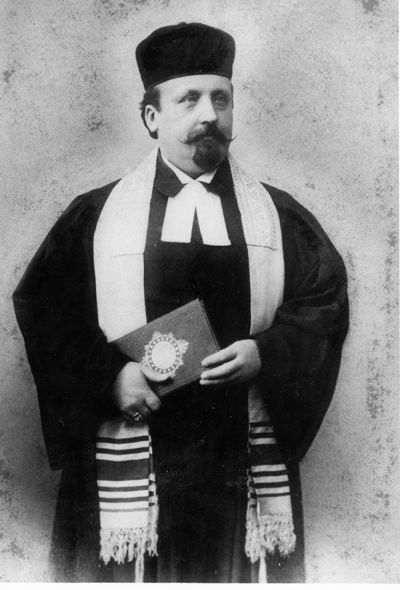Selmar Cerini – the Polish/Jewish Jan Kiepura from Breslau

Selmar Cerini (real name Salomo Izich-ha-Kohen Steifmann) was born into an orthodox Jewish Polish family on 15th December 1860 in Wólka near Warschau, at the time part of the Russian partition sector. From earliest childhood his greatest dream was to sing. In order to achieve this he had to overcome many hurdles. When he was twelve he left home to go to Płońsk, where he sang for two years in the synagogue there. He was subsequently hit by ill health, a temporary loss of voice and existential worries. This did not prevent him from stubbornly pursuing his calling until the time he fell in love. His loved one’s parents did not believe that a poor young man could support their daughter and their future family from singing alone. It was only after many efforts and a vow to pursue the highly-regarded career of a merchant that the parents finally relented and gave their consent to the engagement. Shortly afterwards he was called up by the Russian army, and this took him to the distant city of Kazan. However, he was prematurely released from military service on the grounds of ill health. Cerini married soon after, and from then on he was supposed only to hum his songs to himself during his work in the financial office of his father-in-law in Gąbin near Płock.
But as fate would have it he very soon returned to music and singing. After the family lost all its possessions in the 1882 pogrom he was forced to go in search of a new source of income and accepted the post of Cantor in the synagogue in Zagórów. During this time he became the father of two children. The family did not stay for long in Zagórów. After a brief period in Łódź Cerini decided to emigrate to Germany. In 1887 he left his family with his in-laws and went to Breslau, where his voice impressed the Chief Cantor of the synagogue, Moritz Deutsch, so much that he suggested that Cerini take up a course of study at the Conservatory in Berlin or in Vienna. The director of the Breslau opera house, Georg Brandes, also thought that Cerini had a good voice but recommended him to continue his studies.
After several adventures Cerini was accepted into the Royal College of Music in Berlin. But his stay in Germany proved to be illegal and he was threatened with deportation. He was forced to hide from the police for several months and it looked as if things would end in catastrophe. But fate took a surprising turn. Patrons came to his aid, including the two brothers, Louis and Gustav Sachs and their brother-in-law Adolf Ginsberg. They were all so captivated by Selmar’s voice that this helped him recover his optimism. He was given a passport and brought his family to Berlin, where his voice aroused increasing public interest.
He began to receive offers to sing. He quickly made a name for himself as a choir soloist in one of the Berlin synagogues, and sang his first opera aria in the Victoria Theatre. This was when he adopted the Italian-sounding name of Cerini, which he soon made his official name. But he never decided to assimilate completely and retained his Jewish faith. During this time he was invited to appear in several opera houses and worked for five years in the opera house in Leipzig. At the start of the 1990s he was offered a fixed contract by the Breslau Opera House where he was received enthusiastically by the audiences there. Performances in all the operas he sang were quickly sold out, and he made several guest appearance in other major towns in the Reich, and abroad.
After the death of the Chief Cantor, Max Deutsch, the Jewish community decided to invite Cerini to be his successor. As a result he decided to give up his life as a famous soloist and accept the invitation. But new hurdles stood before him. Following an intrigue he was forced to leave the city, to which he would have only been allowed to return after receiving a certificate of naturalisation. Cerini then travelled to Strasbourg to accept an offer to work there. He quickly proved a success and as a result he was awarded German citizenship. Thanks to his extraordinary talents and stubbornness the poor Jewish boy from Wólka had finally fulfilled his dreams and won material security.
Cerini returned to Breslau in the mid-1990s to take up the post of Chief Cantor in the New Synagogue, where he remained until his death on 11th November 1923. He was laid to rest at the New Jewish Cemetery in the Frankfurter Chaussee, (now ulica Lotnicza). His gravestone can still be seen there with the following inscription.
“From the depths he called to GodHis voice uplifted the hearts
Of worshippers to the peak of devotion”
Krzysztof Ruchniewicz, November 2016
A selection of sources:
A. Mirsky: Selmar Cerini (Steifmann). Chief Canto of the Breslau Jewish Congregation, London 1900.
Elżbieta Osowicz: Marsz Wzajemnego Szacunku we Wrocławiu, “Radio Wrocław“, 9.11.2016.












